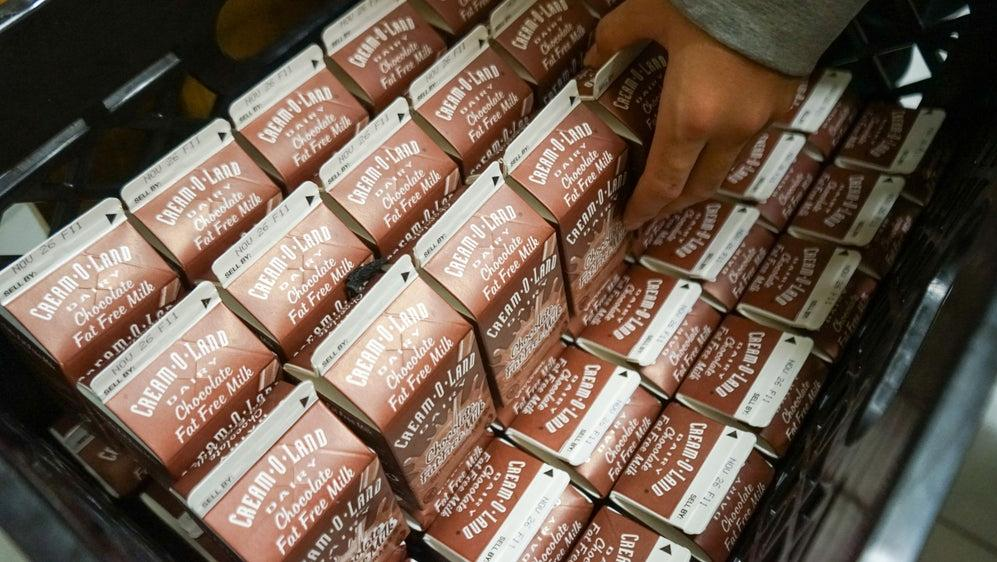Why The Government Might Ban Chocolate Milk In Schools
Brace yourselves—school lunches are about to get even more boring.
The Wall Street Journal has released a new report that makes me feel very lucky I'm not in school anymore. No, it's not a report about how TikTok is ruining every aspect of teenagers' lives or anything. Instead, the WSJ reports that the USDA is proposing a ban on chocolate and strawberry milk in schools. If this doesn't sound like a big deal, you definitely didn't go to my high school.
When I was a freshman, my school cafeteria was the shit. Specifically the first of four lunch lines, the snack line, which had everything a hungry teen could dream of: Warm pretzels with cheese dip. Ice cream cones. Ice cream bars. Ice cream sundaes. Water ice (or Italian ice for the non-Philadelphians) in every flavor. And it was all helmed by a crotchety old woman named Denise, whose utter contempt for her job made her a local legend. If you tapped too loudly on your tray while you waited in line, she would poke her head out and yell, "Tapper! Please stop tapping!" And if, God forbid, you asked her for a sold-out item, she would yell, "Sir! Read the sign!" and point to the whiteboard listing the snacks that were 86'd.
But sophomore year, everything changed. Michelle Obama's Healthy, Hunger-Free Kids Act went into effect, which drastically changed school lunches for the worse. Pizza slices got smaller (even though pizza was technically considered a vegetable). Deli bar day, where you could build your own sandwich, became a dud. People used to leave class early to make sure they could get a good spot in line, but the drastically shrunken sandwiches curbed everyone's excitement. Most egregiously, though: The snack line was no more. Instead, it became a salad line.
The rumor initially sounded like a cruel joke that the seniors started to try to prank the freshmen. But when the first day of school came, we sadly realized it wasn't a joke at all. Denise was still there, but her coveted collection of snacks had been replaced by much-less-desirable mixed greens.
Donald Trump's administration rolled back some of the Obama-era lunch restrictions, but school lunches remain a contentious topic in Washington. Case in point: the USDA's proposed ban on flavored milks.
I would sooner eat bugs than drink a glass of plain, unflavored milk, but if it were chocolate or strawberry, you might be able to convince me. I'm not alone, either: Back in high school, when we were more or less forced to get a mini bottle of milk with lunch, everybody always chose chocolate. I'm not exaggerating. I cannot think of a single time anybody willingly chose to drink plain, unflavored milk. One day, they ran out of chocolate milk, and people simply didn't take any. In the face of a potential ban on chocolate milk, this is the outcome nutrition experts and the dairy industry fear most.
Jessica Gould, who runs nutrition services for a school district in Colorado, saw this happen firsthand during a supply shortage of chocolate milk.
"Do we want kids to get the calcium, the protein, the additional nutrients that are part of milk?" she asked the WSJ. "Because when we were only providing white milk, we did see a significant amount of students didn't take milk in general." But the USDA is concerned that flavored milk contains too much sugar and will lead kids to develop lifelong preferences for sweet beverages. If they're worried now, then for god's sake, nobody show them #WaterTok.
The USDA here finds itself between a rock and a hard place. It's not trying to ruin the little bit of joy left in school lunches, but it also doesn't want to get kids addicted to sugar at a young age. Meanwhile, the dairy industry, desperate to make drinking milk cool again, has committed to creating milks with a maximum 10 grams of added sugar in an effort to appease the government agency. A solution to this problem that no one in the article addresses is to serve whole or 2% milk instead of skim, both of which are lower in added sugar and higher in fat. I thought we were past the days of demonizing fat. It is, after all, an essential nutrient!
So there you have it, USDA. I just solved your problem for you. Feel free to hire me on a contract basis for any other issues that may arise.
